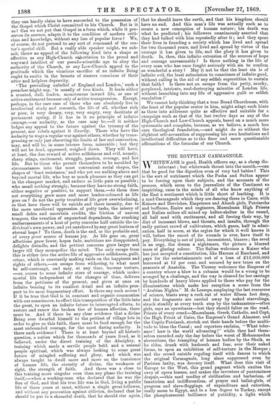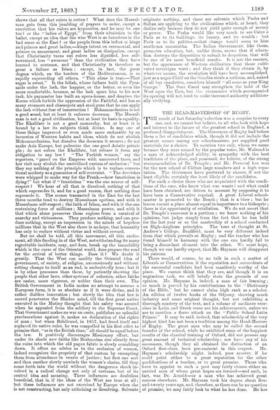THE EGYPTIAN CARMAGNOLE.
WHITEWASH is good, Health officers say, as a cheap dis- infectant; but whitewash thrust into the mouth,—can that be good for the digestion even of very bad babies ? This is the sort of nutriment which the Pasha and Sultan appear to be forcing upon their subjects, and the accounts of the process, which seem to the journalists of the Continent so inspiriting, raise in the minds of all who know anything of the East a sentiment which is little short of loathing. It is a mad Carmagnole which they are dancing there in Cairo, with Kaisers and Dervishes, Empresses and Almeh girls, Patriarchs and buffoons, Emirs and engineers, Mussulman High Priests and Italian sailors all mixed up helter-skelter in the round, all half mad with excitement, and all forcing their way, by dint of incessant blows, and threats, and insults, through the sadly patient crowd of cultivators, which gazes, half in admi- ration, half in scorn, at the orgies for which it well knows it will, before the smart of its wounds is over, have itself to pay. Everything is out of joint, inconsistent, bizarre ; the revel is an orgy, the dream a nightmare, the picture a blurred mass of glaring colour. The Sultan welcomes a Kaiser who has just accepted a constitution, like Haroun al Rascheed, and pays for the entertainments out of a loan of £12,000,000 borrowed at 12 per cent. and secured by new taxes on the peasants of Anatolia. The Viceroy welcomes the Empress of a country where a blow to a cabman would be a wrong to be avenged by a challenge, and the way is cleared for her carriage by hundreds of heavy blows applied to those who pay for the illuminations which make her reception a scene from the "Arabian Nights." M. de Lesseps, employing the last resources of science, blasts away a rock out of water fifteen feet deep, and the fragments are carried away by naked starvelings, struck steadily at every tenth step by the taskmasters—often girls, says an eyewitness—lest they should falter on the road. Priests of every creed—Mussulman, Greek, Catholic, and Copt, the High Priest of Cairo, the Empress's Grand Almoner, and the Coptic Patriarch, stretch out their hands before the multi- tude to bless the Canal ; and reporters exclaim, "What toler- ance! how is the world advancing !" while they had them- selves recorded only the day before the worst of Mohammedan aberrations, the trampling of human bodies by the Sheik, as he rides, drunk with hasheesh and fear, over their naked forms, to open an exhibition of self-torture in the Mosque ; and the crowd outside regaling itself with dances to which the original Carmagnole, long since suppressed even by Parisian laxity, was decency itself. What does this visit of Europe to the West, this grand pageant which excites the envy of opera lessees, and makes the inventors of pantomimes despair,—this mad medley of civilization and barbarism, of fanaticism and indifferentism, of prayer and ballet-girls, of progress and slave-floggings, of expenditure and extortion, really mean to Egypt, and in a less degree to Turkey, except the phosphorescent brilliance of putridity, a light which
shows that all that exists is rotten ? What does the Mussul- man gain from this jumbling of prayers to order, except a conviction that his rulers are hypocrites, and he may be one too ? or the "ladies of Egypt," from their admission to the ballet, except an idea that the wise West is as luxurious in the bad sense as the East? or the people from this influx or kings and princes and great ladies,—kings intent on ceremonial, and princes on amusement, and great ladies on dissipation, except that Christianity turns out rulers leas dignified, less self- restrained, less " awesome " than the civilization they hare learned to contemn, and that Christianity is therefore as great a failure as Islam ; except, in fact, the great dogma which, on the borders of the Mediterranean, is so rapidly superseding all others, "This alone is true,—That sugar is sweet." Is the fellah, whose fathers built the Pyra- mids under the lash, the happier, or the better, or even the more comfortable, because, as the lash spurs him to his new task, his paymaster has built an opera-house, and despises the Koran which forbids the oppression of the Faithful, and has so many steamers and chassepots and steel guns that he can apply the lash without fear of insurrection Mohammedanism is not a good Greed, but at least it enforces decorum. The Mussul- man is not a good civilization, but at least its basis is equality. The Khalifate is not a good monarchy, but at least it is bound by a law its subjects think divine. Is any one of these things improved or even made more endurable by an incursion of Western habits and ideas, which do not abolish Mohammedanism, but dissolve the decorum it secures ; do not make Asia Europe, but pulverize the one good Asiatic princi- ple; do not soften the Khalifate, but release it from any obligation to any law ? "The Turkish women," say the reporters, "gazed on the Empress with uncovered faces, and her visit may abolish the uncivilized custom of seclusion ;" but they say nothing of the principle which is to replace conven- tional modesty as a guarantee of self-restraint. "The dervishes were whipped to make way for the Frank,—how fanaticism is dying:" but what if " fanaticism " was the one source of self- respect ? We hear of all that is dissolved, nothing of that which supersedes it, and for a good reason, that nothing does supersede it. The scenes transacted in the East for the last three months tend to destroy Mussulman egotism, and with it Mussulman self-respect ; the faith of Islam, and with it the one restraining force of millions ; Mussulman power, and with it that which alone preserves these regions from a carnival of anarchy and viciousness. They produce nothing, and can pro- duce nothing, except an impression in the minds of hopeless millions that in the West also there is no hope, that humanity has only to endure without virtue and without reward.
But we shall be told, all this movement, all this excite- ment, all this flooding in of the West, notwithstanding its many regrettable incidents, may, and does, break up the immobility which is the curse of the Oriental world, does prepare the road for the arrival of better things. Does it ? We doubt it greatly. That the West can modify the Oriental idea of government, of society, of religion, unconsciously and without setting change to itself as an end, is undoubtedly true ; but it is by other processes than these, by patiently showing the people that other laws, other systems of cohesion, other faiths are easier, more vigorous, or nobler than their own. The British Government in India makes no attempt to assume a European form, it is as absolute as if it were divine, and it rather dislikes innovation ; but slowly the idea that law is sacred penetrates the Hindoo mind, till the first great native executed in the Mutiny thought that his safety was assured when he appealed from the soldiery to the Supreme Court. That Government makes no war on caste, publishes no splendid proclamations against it, makes no declaration of the rights of man ; but when Rohilcund, in 1857, had freed itself and replaced its native ruler, he was compelled in his first edict to promise that, "as in the British time," all should be equal before the law. It positively discourages Missionary effort, but under its shade new faiths like Brahmoism rise silently from the ruins into which the old pagan fabric is slowly crumbling down. It offers no advice as to the seclusion of women, indeed recognizes the propriety of that custom by exempting them from attendance in courts of justice ; but first one sect and then another slowly unwinds the women's chains, till they come forth into the world without the dangerous shock in- volved in a radical change not only of costume, but of its central idea and meaning. These influences are doubtless beneficial, that is, if the ideas of the West are true at all ; but these influences are not exercised by Europe when she is not constructing, but only criticizing or dissolving. Solvents originate nothing, and these are solvents which Pasha and Sultan are applying to the civilizations which, at heart, they dislike only because they do not yield quite enough of money or power. The Pasha would like very much to see Cairo a Paris as to its buildings, its luxury, and its wealth ; but Paris as to its politics,—that change would seem to him anathema maranatha. The Indian Government, like them,- promotes education, but, unlike them, avows that if educa- tion destroys the disposition to submit to despotism, that will be one of its most beneficial results. it is not the essence, but the appearance of Western civilization that these culti- vated sovereigns want ; and they think if they obtain it, by whatever means, the revolution will have been accomplished, just as a negro Chief on the Gambia steals a uniform, and, naked of all but epaulettes, considers himself "all same as your King George." The Suez Canal may strengthen the hold of the- West upon the East, but the ceremonies which accompanied its opening will not tend to make increased authority addition- ally vivifying.



































 Previous page
Previous page